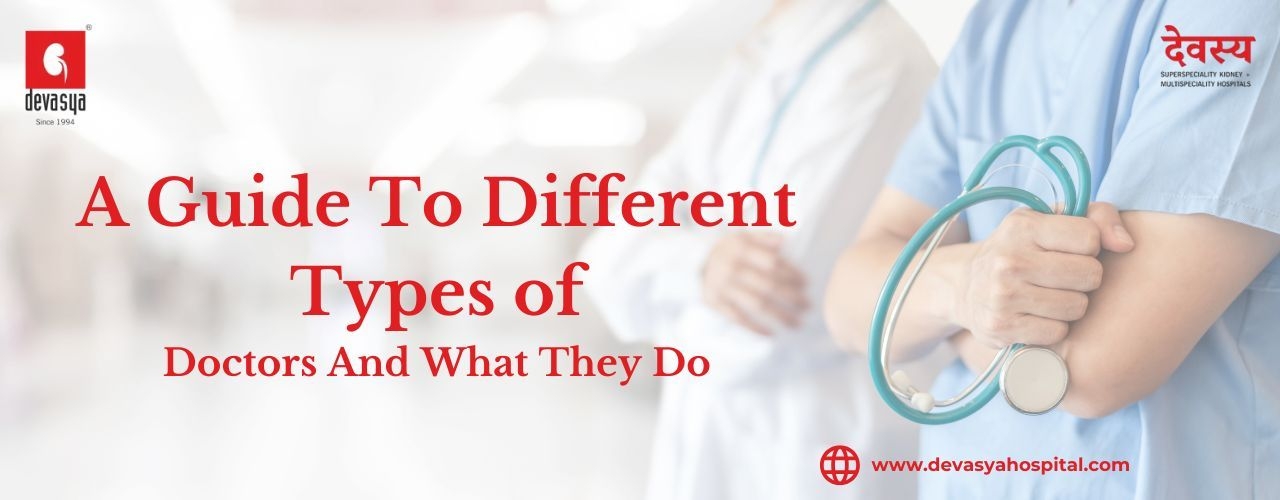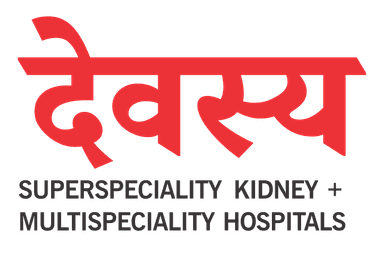A Guide to Different Types of Doctors and What They Do
Dr. Dinesh Patel
Discover different types of doctors, what they treat, and when to visit them. Find the right specialist for your health problem.

Wondering which doctor to visit for your health problem? This guide breaks down different types of doctors, what they do, and the symptoms that mean you should see them. From kidney specialists to emergency care, get clear, easy-to-understand information so you can choose the right expert and get timely treatment.
Not feeling well? The first thing is to visit the right kind of doctor. Many people are unsure which doctor to visit for a particular problem, especially when medical terms like nephrologist or oncologist sounds confusing. At Devasya Hospital, we have a team of expert doctors covering everything from kidney care to cancer treatment, emergency medicine to women’s health.
Every doctor focuses on certain body parts or health problems. Our goal is to make it easy for you to find the right specialist.
This blog explains the most common types of doctors in simple words so you can easily understand who treats what and when you should see them.
Doctor for Kidney Problems - Kidney Specialist / Nephrologist
A nephrologist is a doctor who looks after your kidney health.
What they do
They identify and cure kidney diseases, manage dialysis, and help control high blood pressure related to kidney issues. Their work involves managing conditions like chronic kidney disease, kidney infections, hypertension related to kidney problems, and kidney failure. They oversee treatments, including dialysis and prepare patients for kidney transplants. The best nephrologist helps keep your kidneys healthy and cares for your overall health.
When should you see a Nephrologist or Kidney Specialist?
- Puffiness in the feet, ankles, or near the eyes.
- Foamy, dark, or bloody urine.
- Frequent urination at night.
- Blood pressure that stays high despite taking pills.
- Unusual tiredness or constant fatigue.
- Family history of kidney disease.
Choose a trusted kidney specialist in Ahmedabad who has the experience to provide you with the best possible care.
Doctor for Urinary Problems & Kidney Stones – Urologist
A urologist treats problems of the urinary tract like kidneys, bladder, ureter, and urethra in men and women, along with the male reproductive system.
What they do
They handle urinary infections, kidney stones, prostate troubles, bladder conditions, male infertility, and cancers of the urinary system. They provide both medicine-based care and surgeries, from small procedures to complicated operations. Devasya Hospital is recognized as the best urology hospital in India with a team of expert doctors.
When should you see a Urologist?
- You experience discomfort or burning when you pee.
- You have trouble urinating or a weak stream.
- There is blood when you pee.
- Loss of bladder control.
- Men experience problems with the prostate, such as difficulty urinating.
- You feel severe pain in your side or back, which could be a sign of a kidney stone.
- You need to pass urine often or feel a strong, sudden urge to go.
At Devasya, you will meet the best urologist surgeon in Ahmedabad who is highly skilled in both medical and surgical treatments for urinary disorders, kidney stones, prostate issues, and bladder conditions.
Cancer Doctor - Oncologist / Cancer Specialist
An oncologist identifies and treats all types of cancers.
What they do
They prepare a complete care plan that can involve chemotherapy, radiation therapy, or surgery. The best oncologist offers cancer care using the latest technology and a supportive approach. They guide you through every stage of cancer care.
When should you see an Oncologist?
- You or your doctor finds an unusual lump or mass on your body.
- You have unexplained, sudden weight loss.
- You feel constantly tired, even after resting.
- Your cancer screening test, like a mammogram or colonoscopy, shows unusual results. Family history of cancer.
Women’s Doctor for Pregnancy & Reproductive Health - Gynaecologist
A gynecologist treats health issues related to the female reproductive system.
What they do
They provide services like annual check-ups, Pap tests, and family planning. They also offer expert care during pregnancy, childbirth, and through menopause.
When should you see a Gynaecologist?
- Missed or irregular periods.
- Lower abdominal or pelvic pain.
- Difficulty conceiving.
- Pregnancy or planning for one.
- Vaginal infections or unusual discharge.
- Menopausal symptoms.
- For annual check-ups and screenings like Pap tests.
- For family planning, birth control, or infertility concerns.
We are proud that Devasya Hospital is known as the best gynec hospital for women’s health needs.
Bones & Joints Doctor - Orthopaedic Surgeon
If you have fractures, arthritis, back pain, or sports injuries, you need a bone and joint doctor, called an orthopaedic surgeon. They care for issues with the musculoskeletal system, like joints, bones, muscles, and ligaments.
What they do
Orthopaedic surgeons find and treat problems in the joints, bones ligaments, muscles, and tendons. They manage fractures, arthritis, spinal problems, sports injuries, and perform surgeries like joint replacements and arthroscopy.
When should you see an Orthopaedic Surgeon?
- Persistent joint or bone pain and swelling.
- Difficulty moving or walking.
- You find it difficult to move a joint properly.
- You get hurt in an accident or while playing sports.
- Chronic back pain, numbness, or weakness in limbs.
- You have a broken bone or a serious sprain.
Surgery Doctor for Operations – General Surgeon
A general surgeon is often the first doctor for surgical advice and offers vital care in emergencies.
What they do
A General Surgeon performs common operations on the abdomen, such as removing the gallbladder, repairing hernias, or treating appendicitis. They are trained in a wide range of surgical procedures and are often the lead surgeon in a surgical team.
When should you see a General Surgeon?
- Severe or persistent abdominal pain.
- Swellings or lumps in the abdomen or groin.
- Hernias (bulging bump worsened by coughing).
- Sores or cuts that take a long time to heal.
- Surgery is recommended after diagnosis.
- Handle emergency operations.
Emergency & Trauma Doctor - Emergency & Critical Care Specialists
An emergency doctor gives immediate treatment to patients with sudden sickness or injuries. They are the first to respond in accidents and trauma, where every second matters.
What they do
Emergency doctors provide immediate care for acute illnesses and injuries including, accidents, trauma, heart attacks, strokes, and severe allergic reactions. Trauma specialists treat injuries from accidents and make sure patients get quick care and treatment.
When should you see an Emergency & Trauma Doctor?
- Severe accidents or falls.
- Heavy bleeding.
- Sudden chest pain or breathing difficulty.
- You have an injury from a major trauma, like a car crash.
- Loss of consciousness.
- Stroke symptoms (face drooping, slurred speech, weakness).
ICU Doctor for Critical Care (Intensive Care Specialist)
An intensive care specialist manages critically ill patients in the Intensive Care Unit (ICU).
What they do
An ICU specialist looks after very sick patients who need continuous monitoring and life support. They manage patients with severe infections, organ failure, or post-surgical complications. They team up with other experts to give round-the-clock, advanced care and observation.
When should you see an Intensive Care Specialist?
- Advised ICU care by hospital staff.
- Multi-organ problems, persistent high fever.
- Severe breathing problems.
- Coma, unconsciousness, or unstable vital signs.
- Serious infections that need continuous supervision.
How to Choose the Right Doctor for Your Problem?
Choosing a doctor is a vital and personal decision. Consider these factors:
- Specialization: Choose a doctor whose speciality matches your health problem.
- Experience: Choose doctors who have years of experience in their area of work.
- Hospital and Technology: Good hospital facilities and modern technology help in better treatment.
- Patient Feedback: Reviews and testimonials can show how the doctor treats patients.
- Location: A nearby hospital is helpful for emergencies and regular check-ups.
In the End
When you are not feeling well, it is critical to see the right type of doctor. Each doctor specializes in different health problems, so seeing the right one saves time and helps you get better care. At Devasya Hospital, we have specialists for kidney problems, women’s health, cancer, bone issues, and more, all in one place. With modern equipment and caring staff, we look after you from start to finish, so you do not need to go anywhere else for treatment.
Frequently Asked Questions (FAQs)
How do I find the best kidney specialist in Ahmedabad?
Look for a doctor with proper qualifications, experience in kidney care, good patient reviews, and services like dialysis and kidney transplants.
What symptoms indicate I should see a urologist?
Painful urination, blood in urine, frequent urinary tract infections, urinary incontinence, or kidney stones are strong signals to consult a urologist.
When should I see a gynaecologist for reproductive health?
If you have irregular or painful periods, difficulty conceiving, signs of pregnancy, or menopausal symptoms, it is time to consult a gynaecologist.
Can a general physician refer me to the right specialist?
Yes, a trusted general physician or family doctor can assess your symptoms and guide you to the appropriate specialist, ensuring coordinated care.
What emergency symptoms require immediate hospital care?
Chest pain, breathlessness, severe injuries from accidents, uncontrolled bleeding, sudden loss of consciousness, or severe allergic reactions need urgent emergency care.
How does ICU care differ from regular hospital care?
ICU provides intensive monitoring and life support for critically ill patients who cannot be managed in regular wards due to the severity of their condition.
Which doctor should I consult for kidney stones?
A urologist treats kidney stones by checking the problem, giving medicines, or doing surgery if needed. In many Indian hospitals, the kidney stones are listed under urology.


